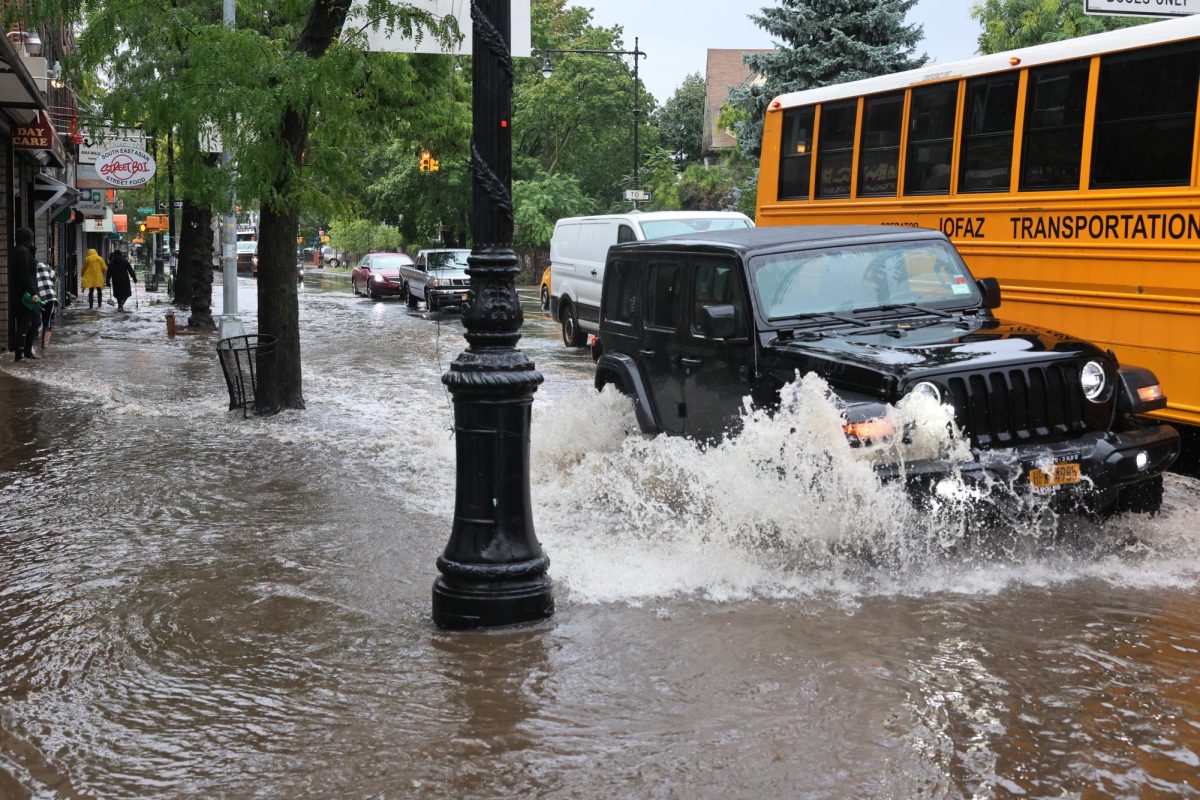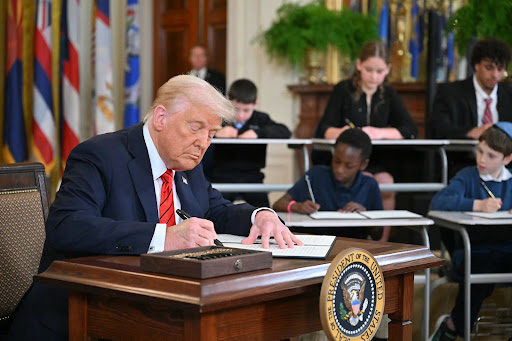On September 29th, over eight inches of rain deluged New York City, overwhelming subway systems, shutting down train lines, and damaging homes. The storm also had many consequences for the Brooklyn Tech community, disrupting commutes, classes, and activities, and flooding areas of Tech’s aging building.
The storm forced the MTA to suspend service for B, G, W trains and Franklin Avenue shuttle trains. In addition, the 1, 2, 3, 6, 7, D, J, N, R, and Q trains, as well as the LIRR and Metro-North Railroad, all experienced service changes. As a result, many students faced difficulties returning home, leading the school to gather affected students in the auditorium to await the return of subway service, rides from parents, or alternative transportation. Dean Jacqueline Manduley was in the auditorium and explained “The latest students were here until maybe 6:15 [PM].”
A poll conducted by The Survey found that 40% of students reported they were affected “a lot” by the storm, while only 6% claimed to be “not at all” affected. Civil Engineering major Andy Chen (’25), expressed that the storm revealed “how vulnerable New Yorkers are when mass transit is paralyzed.” Chen believed that “it [was] irresponsible to make students report to school buildings that day in hindsight, given the major disruptions to all modes of transportation.” In addition, Social Studies teacher, Mr. Izzat Tahan, agreed. “Look at the subways, [they] were all down,” Mr. Tahan noted. “A lot of kids rely on that. I stayed after school, and you could see a lot of kids heading to the auditorium.”
Not only were students affected, but the storm overwhelmed the school’s plumbing and sewer lines. Mr. Tahan, who teaches in room BN1, witnessed the flooding first-hand. “I was the only person on my side [of the basement floor] who flooded,” he said. “On the other side, water was coming down all the windows.” Classes in the basement were forced to move into the auditorium, disrupting classroom instruction. Principal David Newman explained that “we did see some water coming out of sinks, especially on lower floors.” As Mr. Newman noted, this was caused by overflowing sewers which are not under school jurisdiction but rather managed by the city.
Despite all the difficulties, Mr. Newman believes that Tech weathered the storm well. “I don’t know if it looked so great from your [student] perspective, but I think we did pretty good,” Mr. Newman asserted. “We weren’t underwater like some other schools.” Tech’s building largely experienced flooding in the basement, and on the first and sixth floors, the custodians dealt with the flooding very quickly.
All student activities such as after-school clubs and PSAL sports were canceled due to the storm. Brooklyn Tech’s Debate Team, which was set to leave for a debate tournament in Washington D.C. the morning of the 29th, faced a delayed arrival to the tournament due to road closures around New York City. Law and Society major and President of the Debate Team, Nathaniel Kolker (‘24), said that because of the heavy downpour, “My team was late to our tournament in D.C. and we had to forfeit our first round, which negatively affected [our] placement in the tournament.”
The New York City Department of Environmental Protection Commissioner, Rohit Aggarwala, recognized that the city needs to prepare for extreme weather events. In an interview with CNBC, Aggarwala stated, “What we once thought of as a rare event, a low probability of occurrence — maybe these events are increasing in frequency.” He also mentioned several city projects currently in progress that are designed to reduce the impact of “cloudbursts,” a term used to describe sudden, heavy downpours. These projects, ranging from rain gardens and flood barriers, to “the bluebelt program,” have collectively received $400 million of funding from the New York City Department of Environmental Protection. These infrastructure projects have made slow progress, however.
This recent storm highlighted the consequences of extreme weather increasingly linked to climate change and revealed shortcomings in the city’s existing infrastructure. “[The] climate is changing faster than our infrastructure can keep up,” admitted Mr. Aggarwalla. Although Mr. Newman believes that Tech handled the storm well, many felt that the decision made by the DOE to keep schools open was negligent. In an interview with The New York Times, Brooklyn parent Jessamyn Lee argued that “holding school today knowing this was coming feels irresponsible.” While Tech was certainly affected by the storm, other schools in New York City experienced far worse impacts, with one public school in Brooklyn even forced to evacuate as floodwater caused a boiler to start smoking.
September 29th’s flooding made it clear that New York City’s flood infrastructure must adapt to the world’s quickly changing climate. Commissioner Aggarwala agreed, stating that “Everything the science tells us is that [the climate is] going to get worse before it stabilizes,” and urged New Yorkers “to start thinking about extreme weather” with urgency.








































